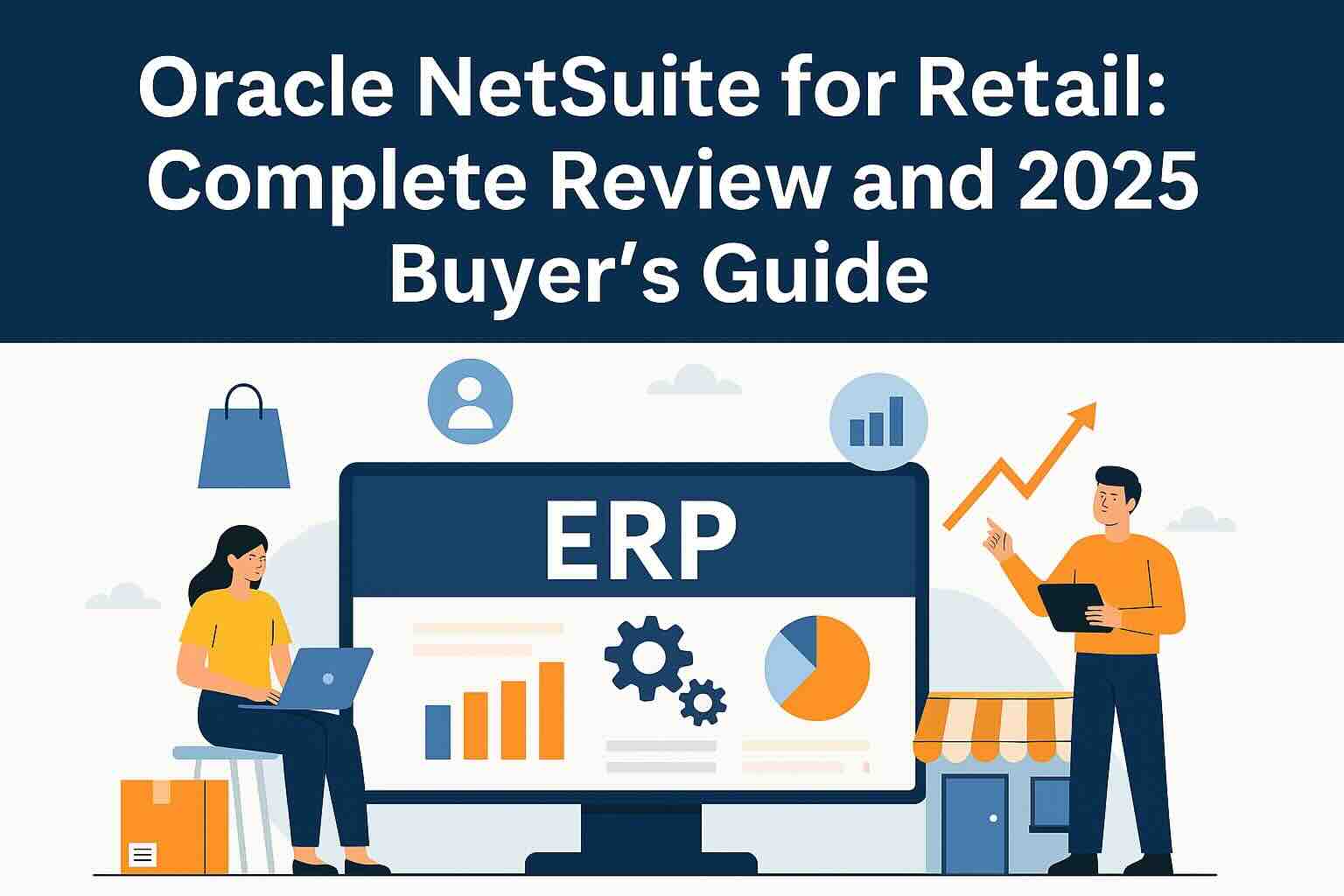Oracle NetSuite for Retail: Complete Review and 2025 Buyer’s Guide

In today’s highly competitive retail industry, operational efficiency is critical to staying ahead. Retailers must juggle inventory management, supply chain coordination, omnichannel sales, customer engagement, and financial oversight, all while adapting to fast-changing consumer expectations. This is where Enterprise Resource Planning (ERP) systems play a pivotal role.
Among leading ERP solutions, Oracle NetSuite for retail stands out as a cloud-based platform designed to unify these processes. But is it the right choice for your retail business in 2025? Let’s explore its strengths, weaknesses, and what you should consider before investing.
Strengths of Oracle NetSuite for Retail
1. Comprehensive Retail-Specific Functionality
Oracle NetSuite offers an extensive suite of modules tailored for retail, including ERP, CRM, point of sale (POS), e-commerce, and financial management. This allows retailers to manage everything from procurement and inventory to marketing and sales in a single platform. The unified architecture eliminates silos, creating a seamless flow of information across your organization.
2. Real-Time Analytics and AI-Driven Insights
Modern retail requires instant visibility into performance. NetSuite delivers real-time dashboards and has recently integrated AI-powered forecasting tools to predict demand, optimize inventory, and automate pricing strategies. This level of insight helps retailers respond quickly to trends and improve decision-making.
3. Scalability for Growing Retailers
NetSuite’s cloud-based architecture makes it easy to scale as your business grows—from small boutiques to enterprise retail chains. Features like NetSuite OneWorld also enable global expansion by supporting multiple currencies, languages, and tax regulations.
4. Unified Commerce and Omnichannel Support
Oracle NetSuite enables true omnichannel retailing by integrating online stores, brick-and-mortar POS, and mobile commerce into one system. Many retailers leverage NetSuite POS (often paired with ConnectPOS) to sync inventory and customer data across locations, ensuring a consistent customer experience.
5. Global Reach
With built-in compliance for various tax laws and international operations, NetSuite is well-suited for retailers operating in multiple regions. Global reporting and consolidated financials further streamline multinational management.
Weaknesses of Oracle NetSuite for Retail
1. High Cost of Ownership
While powerful, NetSuite is not budget-friendly. Pricing typically starts around $999/month for the base license plus $99–$199 per user per month, with implementation and customization often costing several thousand dollars. This makes it better suited for mid-sized to large retailers rather than startups.
2. Complex Implementation Process
Deploying NetSuite can be challenging and time-consuming, particularly for businesses with legacy systems. While Oracle’s SuiteSuccess program simplifies deployment, many companies still require external consultants to fully customize the system.
3. Customization and Integration Challenges
NetSuite’s flexibility allows deep customization, but this can drive costs higher. Integration with niche retail tools (loyalty programs, third-party logistics, etc.) may require additional development and technical expertise.
4. Learning Curve and Training Needs
Due to its broad functionality, staff training is essential. Teams often need weeks of onboarding to fully utilize features like advanced reporting, AI tools, or complex POS configurations.
5. POS Connectivity Requirements
NetSuite POS and ConnectPOS integrations are feature-rich but depend on stable internet connectivity. Retailers with offline or remote operations may need additional setup or contingency plans.
Is Oracle NetSuite for Retail Right for Your Business?
Oracle NetSuite for retail remains one of the most robust ERP solutions available in 2025. It offers unparalleled integration of ERP, CRM, POS, e-commerce, and AI-driven analytics, making it ideal for retailers looking to unify operations and scale globally. However, the platform’s high cost, complex setup, and training demands can be barriers for smaller or budget-conscious businesses.
For mid-sized and large retailers, NetSuite can streamline operations, reduce inefficiencies, and provide actionable insights that drive growth. For smaller businesses or those with simpler requirements, alternatives like Odoo, Acumatica, or Zoho Inventory may offer a more cost-effective fit. To find out more about Oracle Netsuite you can visit this link.
Final Takeaway
If your retail strategy includes omnichannel sales, rapid scaling, and data-driven decision-making, investing in Oracle NetSuite for retail can future-proof your operations. However, ensure you factor in implementation timelines, training needs, and total cost of ownership before making the leap.
Find Out If Oracle NetSuite for Retail Is Right for You
Choosing the right ERP can transform your business. With our AI-powered Compare ERP tool, you can quickly explore and compare solutions tailored to your needs. In less than five minutes, you’ll receive a personalized recommendation based on your business priorities.
Our advanced engine analyzes millions of data points across 100+ ERP solutions, delivering your top three matches and it’s completely free.
Take the first step toward streamlining operations and boosting productivity and start comparing ERP solutions today.









